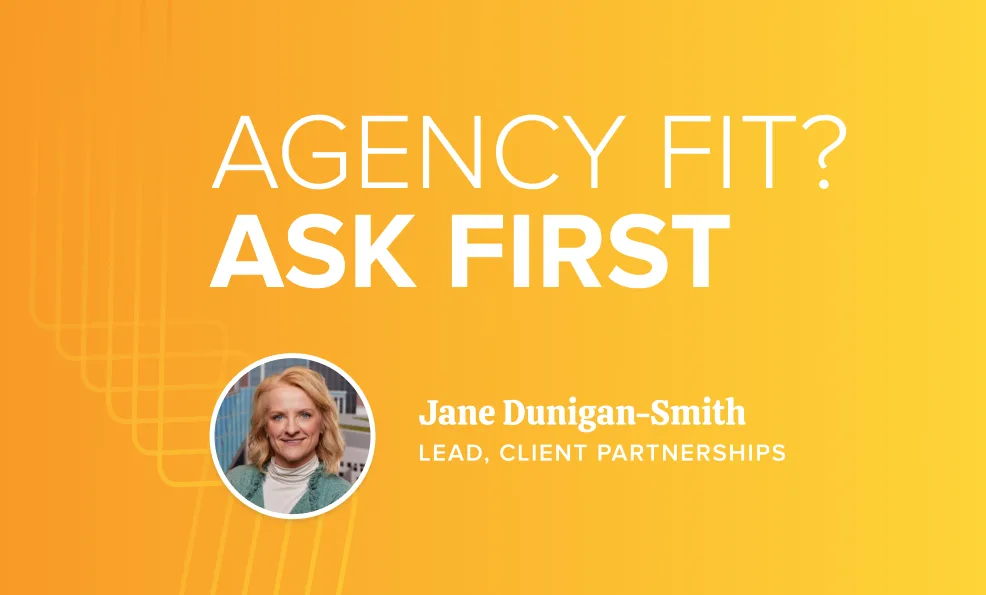While existing reputation and portfolio are important to consider when searching for an agency partner, a successful partnership depends on finding the right fit for your organization. Carefully considering the fit will affect your organization’s short- and long-term marketing success.
We’ve found that a collaborative, conversational approach to an agency search allows both parties to truly understand what it would be like to work with each other. On your quest to find the best agency for you, consider these five key questions.
1. Is the agency goal-driven?
The first step in kicking off a project is to discuss project goals as a team. Our agency identifies project expectations by asking critical initial questions, such as:
What does success look like to you for this project?
What is your primary goal with this project? Are there other business objectives you want to accomplish along with the primary goal?
How do these main goals and objectives help your company grow, or how do they affect other parts of your business?
While agencies might be extremely creative or have top-notch talent on staff, they may also overlook the importance of setting and adhering to project goals. Making sure your agency is driven to accomplish those goals is one of the most important characteristics you can consider on your agency search.
2. Is the agency detail-oriented?
We don’t like to nitpick, but the details really do matter. No matter how tight the deadline, each project needs a plan of action and project timeline. These two pieces hold both teams accountable for completing work and meeting deadlines.
Plan of Action: Outline the project in its entirety. What are the project's goals, expectations and success metrics? What are the project phases to completion, and what resources does each phase require? How many rounds of review and feedback will there be per deliverable? What happens if someone misses a deadline? How often will teams touch base or have check-ins? Is there a set budget for this project, and how should budget updates be communicated (e.g., weekly email reports)?
Project Timeline: Outline each project piece, deliverable or phase, and assign a due date to meet the final project deadline. Who will work on which phase of the project, and when will they do so?
3. Is the agency transparent?
Establishing trust early is one of the best ways to manage expectations, so you'll want to address a few questions upfront about the agency's transparency:
Is the agency prepared for transparency on their side and yours? (e.g., Does the agency hide details about their design process?)
Does the agency encourage open feedback, or do they stifle it by constantly over-explaining their rationale or ignoring your advice?
Does the agency give honest, direct feedback, instead of just saying "yes" all the time? (e.g., Does the agency provide strategic, honest advice, even when it's different from initial creative briefs?)
Does the agency admit when mistakes have been made, or do they proactively provide an update along with a solution to get back on track?
4. Is the agency inquisitive?
Facilitating feedback to your agency allows the agency to understand where they may need to revisit a project and where to ask additional questions to fully understand where there may be shortcomings.
As a personal example, our team sifts through feedback to understand what our client is saying, and we often reach out with additional questions to elicit further thoughts, such as:
What specifically is not hitting the mark? Why?
Can you point to an example of something similar to what you’re looking for?
What would you have done differently in this particular design?
In our experience, asking questions about our clients’ assessments and feedback helps us better understand our clients’ points of view before we move on to the next phase in a project.
5. Is the agency communicative?
As an agency, one of our main jobs is to excel at communication. Our goal is to deliver clear and actionable information that keeps clients informed of project progress. Our communication style is modified for each client relationship, but as an agency, we rely on the same tools to help us effectively communicate with our clients.
There are many ways to communicate besides email, phone calls and meetings. Some of our favorite tools for enhancing communication—and transparency—include:
Basecamp: This project management tool is great for organizing assets, to-do lists and message threads directly with your team. All of the communication remains in one place, so it’s easy to look back and reference previous conversations and feedback.
Google Hangouts: Whether your agency is across town or across the country, video chat platforms such as Google Hangouts allow you to enhance your communication without leaving your desk. Video chat allows you to see facial expressions, quickly share screens and easily engage multiple people for real-time conversations.
ProofHQ: This review tool is an excellent way to collect feedback from both teams in one place for easy communication and quick references to feedback and requested changes.
Slack: This messaging application is a real-time way of chatting with your team throughout the day in a less formal way than with email or a project management tool like Basecamp. In a world where instantaneous conversation and results are expected, this is a good way to make sure you’re able to communicate directly with your teams when and where it's convenient for you.
SmartSheet: This project management tool is more visual than others and allows both teams to see a holistic view of the timeline along with other customized worksheets, such as hours reports, project lists and Gantt charts.
With these five characteristics in mind, starting a new, productive partnership is simple! Your perfect agency is out there somewhere, and even if it’s not us, we’d love to start a conversation with you. Let us know how we can help.

